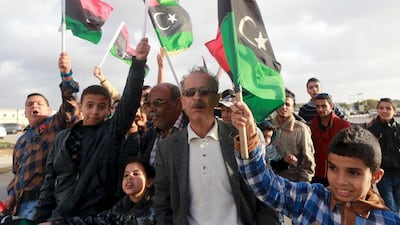Libya’s two warring governments have launched separate assaults on ISIL days after US airstrikes killed more more than 40 of the extremist’s fighters.
In the city of Sabratha, just west of the capital Tripoli, militia fighters from the Libya Dawn administration in Tripoli had surrounded a group of militants in a suburb on Wednesday night.
ISIL briefly captured central areas of the city after storming Sabratha’s police headquarters on Tuesday night and beheading 12 officers. ISIL launched the attack after a crushing defeat inflicted on its fighters earlier on Tuesday on the other side of the country.
That defeat came when an offensive by troops aligned with the internationally-recognised parliament based in Torbruk in the east pushed ISIL extremists out of central Benghazi.
The offensive was spearheaded by Libya’s maverick general, Khalifa Haftar, who is popular in the east but despised by Libya Dawn.
The military pressure on ISIL from Libya’s opposing governments come as a growing international coalition is assembling against the extremists in Libya.
Fifteen French special forces have been deployed in Benghazi, working with Gen Haftar’s troops to battle ISIL militants and militias, Libyan military officials said on Wednesday.
The French forces, along with US and British teams, are setting up an operations room in the city’s Banina airbase, the officials said.
It follows the Pentagon’s admission last month that its own special forces are working in Libya, seeking to gain support for air strikes on ISIL. The strikes came on Friday when US F-15 bombers pounded an ISIL camp near to Sabratha targeting prominent leader leader Noureddine Chouchane.
On Monday Italy agreed that armed US drones can operate against the militants from its bases.
ISIL has grown in strength in Libya, thriving on the chaos that came after the downfall of dictator Muammar Qadhafi which plunged the country into a civil war.
While ISIL suffered a significant defeat in Benghazi this week, it remains a powerful force in its stronghold, the central coastal city of Sirte, around which it holds 180 kilometres of coastline.
Residents on social media provided a running commentary of the group’s brief takeover of Sabratha, describing how ISIL fighters “swarmed” into central areas after darkness fell.
The municipal council said the extremists had exploited a “security vacuum” in the town centre as militia fighters loyal to the Libya Dawn militia coalition in Tripoli conducted raids looking for ISIL operatives in the suburbs.
By dawn, ISIL units had retreated from the centre after losing at least four fighters. The extremists regrouped in the eastern suburb of Zwaga, apparently taking with them the heads of the killed police officers.
In Benghazi, Gen Haftar’s offensive began on Saturday with air strikes and artillery hammering militant positions in the eastern city. Then, on Tuesday, ISIL lines broke and government troops surged through the central districts of Leithi, Hawari and Sabri.
At sea, a naval gunboat pounded ISIL positions near the port, while armoured units overran a series of bases belonging to ISIL and militia groups, including the headquarters of Raffalah Al Sahati, one of the city’s most powerful militias.
ISIL units remained dug into fortified buildings on the south-western outskirts of Benghazi on Wednesday, but despite this, thousands of residents returned home after fleeing the city when fighting erupted in May 2014.
Red Crescent teams patrolled the shattered streets, warning returning residents about the danger of booby traps, some hidden in piles of shoes left behind by the retreating militants.
For Gen Haftar, the victory in Benghazi is a personal triumph, coming a week after his troops pushed ISIL out of the town of Ajdabiya to the south-west, which is close to the country’s oil ports.
Meanwhile, the parliament in Tobruk on Tuesday delayed a vote on a UN-backed unity government after failing to reach a quorum, the third postponement by the body this year.
Both the United Nations and the United States want to see a unity government to end civil war between the country’s rival administrations, an agreement that would allow both to focus on combating ISIL. The plan for a government of national accord, to be based in Tripoli, has been publicly backed by states including the UAE, US, Britain, France, and Italy, but many in the recognised parliament object to sharing power with Libya Dawn.
On Wednesday, however, 100 of the recognised parliament’s 176 members said they supported a unity government but were “forcibly prevented” from voting on Tuesday after receiving threats.
foreign.desk@thenational.ae
* With additional reporting by Agence France-Presse and Associated Press

